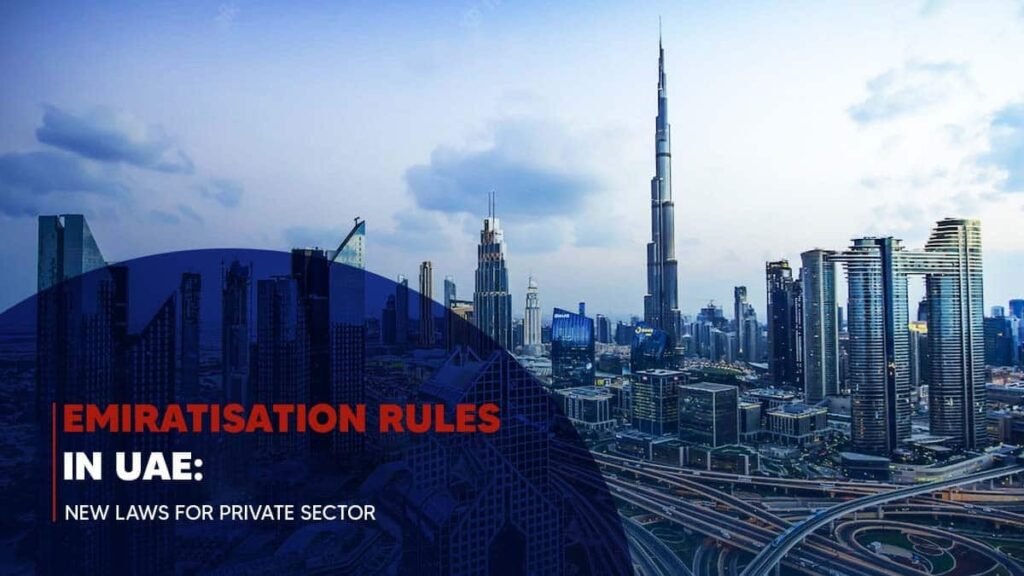The Emiratisation Law has been a central part of the UAE government’s strategy to boost employment among Emirati nationals. In 2024, new regulations have been introduced to further integrate Emiratis into the private sector workforce. These changes aim to reduce the country’s dependency on expatriate labor and empower local talent, thereby ensuring a more sustainable and diversified economy.
Understanding the Emiratisation Law
At its core, the Emiratisation law mandates that private sector companies hire Emirati nationals to specific quotas. This is part of the broader Emiratisation policy, which seeks to provide job opportunities for UAE citizens and encourage their active participation in the economic development of the nation.
Under the new framework, all private companies operating in the UAE, including those in both the mainland and free zones, must comply with Emiratisation targets. However, the rules regarding these two business setups differ in certain aspects, particularly regarding enforcement and compliance.
Key Changes in the Emiratisation Law for 2024
- New Hiring Targets for Private Sector Businesses
In 2024, companies with 20-49 employees are required to hire at least one Emirati by the end of the year and another by 2025. This marks an expansion of the previous law, which mostly targeted larger firms. For larger companies, the targets are more rigorous, with firms employing 50 or more workers expected to increase their Emirati workforce by 1% every six months, amounting to a 2% increase annually. By 2026, these companies should aim for a 10% Emiratisation rate. - Industry-Specific Emiratisation Targets
The UAE government has introduced sector-specific quotas that companies must meet. These include a range of industries such as banking, healthcare, education, technology, and more. Notably, companies in sectors critical to the UAE’s future, such as tech and innovation, are expected to play a pivotal role in the success of this initiative. - Compliance and Penalties
As of July 1, 2024, businesses that fail to meet their Emiratisation targets will face significant fines. For companies with 50 or more employees, fines of AED 48,000 will be imposed for each unfilled Emirati position. Companies with 20-49 employees will face a fine of AED 96,000 in 2024, with penalties increasing each year. The Ministry of Human Resources and Emiratisation (MoHRE) will oversee compliance, and companies that repeatedly fail to meet quotas risk having their work permit applications suspended.
Free Zone vs. Mainland: Different Rules for Different Business Setups
While the Emiratisation law applies broadly across the private sector, there are distinct rules depending on whether a business is based in the mainland or a free zone.
Mainland Businesses
For businesses located in the UAE mainland, the Emiratisation targets are mandatory and strictly enforced. Companies with a mainland setup must adhere to the stipulated Emiratisation quotas and are subject to regular audits and inspections by the MoHRE. Mainland businesses are also required to submit detailed reports on their hiring practices and to show progress toward their Emiratisation goals.
Mainland businesses are directly impacted by the new laws, especially since the UAE government is pushing for a 10% Emiratisation rate by 2026. These companies must hire Emirati workers in line with their workforce size and sector. Moreover, any violations of the law, such as hiring expatriates for positions that should be filled by Emiratis, are penalized.
Free Zone Businesses
In contrast, free zone companies are not required to meet the same Emiratisation quotas. While they are encouraged to hire Emiratis, the regulations are less stringent than for mainland businesses. Free zones enjoy certain exemptions that make them more attractive for foreign investors and businesses seeking flexibility. However, free zone companies that wish to benefit from government contracts or other incentives may be incentivized to take part in the Emiratisation program. The UAE government offers various incentives for companies in free zones that contribute to Emiratisation, such as financial rewards or support through platforms like Nafis, a government program aimed at boosting the employment of Emiratis.
Although free zone businesses are generally not subject to the same fines and penalties as mainland businesses, they still play a role in the broader Emiratisation goals and may voluntarily choose to participate in the initiative to support the country’s long-term economic vision.
Financial Penalties and Consequences of Non-Compliance
Both mainland and free zone businesses must be aware of the penalties for non-compliance with Emiratisation targets. While free zone companies have more leniency, mainland companies that fail to meet their targets face hefty fines starting at AED 48,000 per unfilled Emirati position. These fines increase annually, and the government has shown no signs of reducing the stringency of enforcement.
Furthermore, businesses that engage in fraudulent practices, such as claiming fake Emiratisation figures or falsely reporting Emirati hires, will face severe penalties ranging from fines of AED 20,000 to AED 100,000 per employee. Such actions will also result in the suspension of any government benefits related to Emiratisation, including incentives and support for hiring and training Emiratis.
The Role of the Nafis Platform
The Nafis platform is a key tool in ensuring compliance with the Emiratisation law. It connects companies with qualified Emiratis and provides a digital space for businesses to manage their Emiratisation programs. Whether you are in the mainland or a free zone, the Nafis platform supports firms in finding qualified UAE nationals for employment and helps manage the required documentation for Nafis incentives.
By registering on the Nafis platform, companies can access various government-supported training programs designed to improve the skillset of Emirati workers, making them better equipped for roles in both the public and private sectors. Moreover, the platform offers assistance in navigating the regulations surrounding Emiratisation, ensuring that companies stay compliant with both mainland and free zone rules.
Key Takeaways for Companies in UAE
- Mainland companies are required to adhere to strict Emiratisation quotas and face penalties for non-compliance.
- Free zone companies are exempt from strict Emiratisation laws but are encouraged to participate to benefit from government incentives.
- Emiratisation targets differ based on company size and sector, with larger firms required to hire a larger proportion of Emiratis.
- The Nafis platform is an essential resource for both mainland and free zone companies to manage hiring, training, and compliance.
As the UAE continues to prioritize local talent through its Emiratisation law, businesses must remain vigilant and proactive in meeting the evolving requirements. Whether operating in the mainland or in a free zone, the Emiratisation program plays a crucial role in shaping the UAE’s future workforce and contributing to the country’s overall economic growth.







